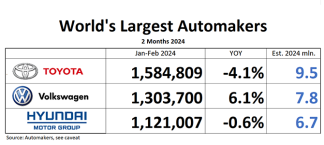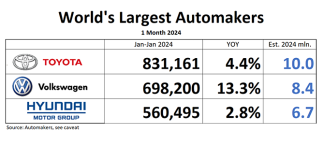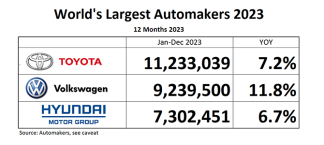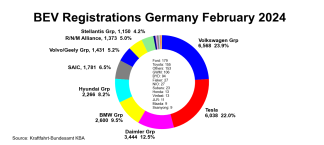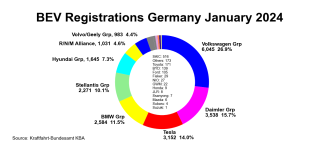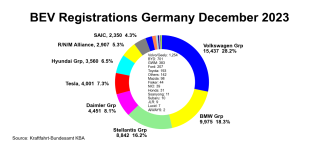End of last week, Ebola and ISIS played second fiddle (for a few seconds, at least) to the shocking news that Volkswagen has dethroned GM as the world’s second largest automaker. Trouble is, there was no dethroning. Volkswagen has been in the number two position since last year, and has remained there quarter for quarter ever since. The Detroit-fixated media is missing a much hotter story: The race for the number one position, a duel between Toyota and Volkswagen.
The misreporting was started by a not completely untrue, but highly ambiguous report by AP titled “VW nudges GM out of 2nd place in global sales race.” The headline was later corrected to “VW edges GM to hold 2nd place in global sales race,” but that could not stop the ricocheting story from doing further damage. By the time the news had reached the Detroit Bureau (which really should know better than the AP), the headline did read “GM Slides to 3rd as VW Nabs 2nd Spot in Global Sales.” Life in the beleaguered Detroit bunker appears to cloud perception, and some who hunker in the bunker missed GM’s sliding to number three in 2013.
There is hope, or so it seems: The gap between nine months sales of GM and Volkswagen is only some 28,000 units, nothing that couldn’t be corrected by dumping a few additional cars on dealer lots. If necessary, a Shanghai massage of the very pliable Chinese numbers should produce a happy ending, and put GM back in #2 – or so friends of the General are led to believe. Friends, you are being had, again. Volkswagen actually is some two hundred thousand units ahead of GM.
Whereas GM and Toyota report everything from the tiniest cars through the heaviest of trucks, Volkswagen has the nasty habit of excluding from the monthly sales updates their heavy trucks and buses made by Volkswagen Group companies Scania and MAN. By the end of the year, those heavy trucks and buses suddenly appear. This is what happened to the 2013 numbers, and this is what will happen again to this year’s numbers. Scania and MAN together are good for more than 225,000 units annually, a fact an adroit follower of the race of the lumbering elephants must keep in mind to avoid surprises and a misleading of the readership.
| World’s Largest Automakers | ||||
| 9 Month 2014 | ||||
| Jan-Sep 2014 | Jan-Sep 2013 | YoY | 2014 proj. | |
| Toyota | 7,674,000 | 7,536,260 | 1.8% | 10,232,000 |
| Volkswagen | 7,400,000 | 7,030,000 | 5.9% | 10,092,000 |
| GM | 7,371,743 | 7,250,764 | 1.7% | 9,829,000 |
| Source: Company data. GM, VW: Deliveries. Toyota: Production. Blue: Estimate | ||||
| Volkswagen data ex MAN and Scania, but included in estimate. Toyota Jan-Sep 2014 estimated |
||||
Let’s have a look at hard numbers, with the caveat that Toyota’s 9 month numbers will not be available until the end of this month. We wanted to wait until the numbers are available, but the bogus reports force our fingers on the keyboard. We will update the figures when available, but we don’t expect them to be materially different from our current estimate.
The 2014 projection shows how the year should end as long as the current trajectories continue. For Volkswagen, we added Scania and MAN based on prior year sales. That chart shows the three contenders separated by some 200,000 units by year-end, something we anticipated since the middle of the year. Volkswagen is expected to pierce the 10 million mark and will declare victory in in its “Strategie 2018” (as amended, it originally said they wanted to beat Toyota).
It is highly unlikely that Volkswagen unseats Toyota this year, especially when considering the fact that Toyota plans to produce 10.42 million units in calendar 2014, and especially when considering the fact that Toyota’s forecasts are notoriously conservative.
Following the trajectories beyond year’s end, it is entirely possible that Volkswagen unseats Toyota from the #1 spot as early as 2015. VW’s growth rate currently is three times that of the other two contenders.
“Believe me, we don’t care,” said Toyota spokesman Brian Lyons when quizzed about the possibility of being overtaken by Volkswagen. This is one of the few times I believe it.
For a long time, Toyota has been on record that it is on an extended pit stop in the global sales race. For nearly a year, Toyota has been pushing a basically zero growth strategy. Despite running at a global capacity utilization of around 95 percent, Toyota steadfastly maintains its “no new plants before 2016” mantra. Toyota seems to be wary of another financial shock, and it wants to be better prepared than in 2008.
P.S.: Sticking with OICA rules, we use production as the yardstick, not “sales.” Volkswagen and GM report “deliveries” to wholesale, numbers that should resemble production much more than actual sales to end users. Even, and especially those can be and are heavily manipulated.

